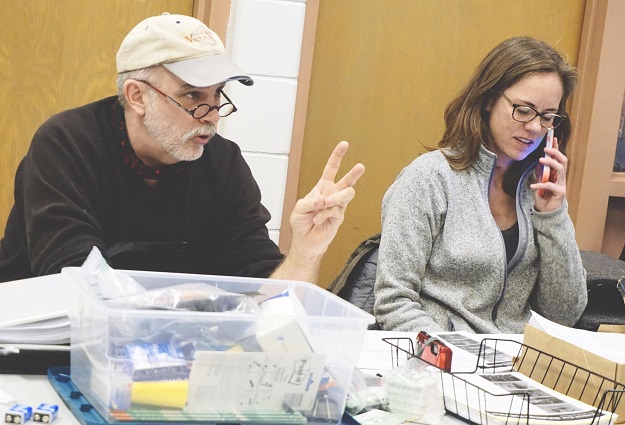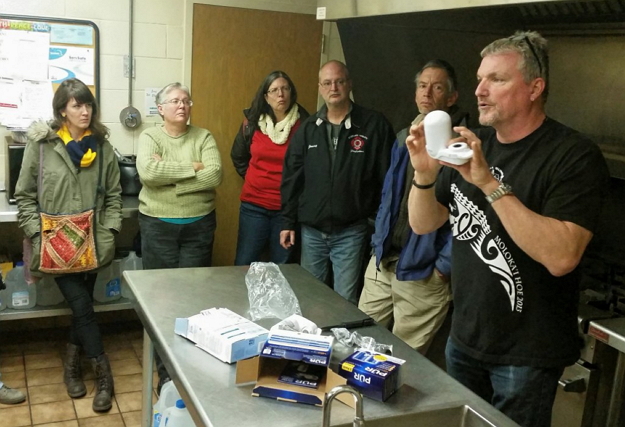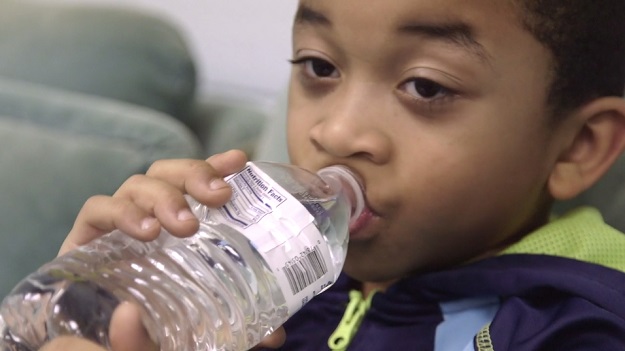The Water in Flint Is Better, but People Aren't Using It

By:
It's been more than a year since the Flint, Michigan, water crisis first made national headlines, and today the quality of the city's water is good enough that residents can safely drink it through filters.
But Flint residents — burned by repeated lies and deception on the part of state officials — largely refuse to do so. And their reluctance could prolong the public health effects of the crisis and jeopardize the city's water system going forward.
Michael Hood, the executive director of the Flint-based frontline aid group Crossing Water, said he and his volunteers see non-working or uninstalled water filters, residents who don't understand how to use their filters, or residents who don't have filters at all in more than half of the homes they visit. And he blamed the state's misconduct.
"The state has a lot of blood on its hands over this, and that's going to remain in people's minds," Hood said. "The state says, 'It's OK, we'll rescue you,' and people think that's bullshit. And I think that fear and mistrust is legitimate. And it's having a bigger impact than they know, because if the water's getting better, [Flint residents] need to start trusting this water at some point."
 Stephanie Kenner/Crossing Water
Stephanie Kenner/Crossing Water
Residents still leery of the water.
Testing in August by the Michigan Department of Environmental Quality — the oversight organization whose failure to respond quickly contributed to the crisis — indicated that Flint's water, which has been treated with corrosion-controlling phosphates for months, now meets federal standards for lead. Of the 162 sites MDEQ sampled, 146 were under the federal action level of 15 parts per billion of lead.
Siddhartha Roy, who works with the Virginia Tech engineering team that initially detected lead in the water, said that independent testing from the VT team in July supported the state's conclusions. He also said that the reddish-brown, foul-smelling water that initially alarmed residents is largely gone.
But the noxious odor and ugly hues weren't actually the result of lead contamination. They came from iron in the water, which leached off of the iron water mains that feed water to the city's lead service lines. Getting the water back to its normal appearance, therefore, doesn't mean the lead has been removed — it just means the relatively nontoxic iron is gone.
Deadly lead, on the other hand, is odorless, colorless, and flavorless. The only way to establish that water from a given source is lead-free is to perform thorough scientific testing — and to trust the results.
For many Flint residents, Roy said, that trust is too much to ask after state officials and the MDEQ betrayed them during the early stages of the water crisis. They're refusing to drink the city's water, and no amount of reassurance from experts about the effectiveness of filters can convince them otherwise.
"Residents have made it clear to us that, 'Look, we trust your [Virginia Tech] team, and we trust your word, but we will not use this water for any purpose until our lead pipes are removed — we can't afford to,'" Roy said.
A water Catch-22.
Like other complex systems with a lot of moving parts — a car, for example — a municipal water system needs regular usage to stay in good working order. If residents don't start using Flint's water system in large numbers, the system will struggle to stabilize, Hood and Roy both said.
And public health problems can also multiply when residents stop using municipal water.
Genessee County, where Flint is located, has seen cases of shigella bacteria more than triple so far this year, MLive.com reported in September. Some public health experts believe that Flint residents' refusal to use municipal water for hand-washing may be fueling the outbreak of the bacteria, which can cause fever and bloody diarrhea.
Lies and deception.
The official word from the state last October that the water was unsafe to drink came only after Michigan Gov. Rick Snyder's office and the MDEQ spent more than 17 months ignoring complaints from residents about their tap water, attempting to downplay the severity of the crisis and even working to discredit the results of the Virginia Tech research team.
Those 17 months of hand-wringing and outright deception created a deep mistrust among Flint residents for all levels of government, which is making it hard for aid workers and public health officials to convince them they can trust the filters, Hood told ATTN:.
No functional plumbing.
In other cases, residents run hot water through the filters, which can compromise them, Hood said. He blamed the state government for such filter misuse, saying that state officials haven't done enough to reach out to residents and educate them about how to use the filters.
Many of these Flint residents, he added, don't even have functional plumbing in their homes to which the filters can affix.
 Crossing Water
Crossing Water
Living out of bottles.
Instead of using filtered tap water, many residents are still organizing their lives around obtaining huge quantities of bottled water, Hood said. Most residents can acquire free cases of water from Flint's water aid stations, but driving to the aid stations and transporting water back over and over can be a nightmare, especially for those who don't have cars or for single mothers who have children they can't leave alone.
Undocumented immigrants have suffered especially hard during the water crisis, Hood said. They've mostly stayed away from the city's water aid stations and been forced to get bottled water on their own from liquor stores because of the state's policy of asking for identification from residents before providing water, he added.
"[Undocumented folks] were told early on that if they want water, they need to produce ID," Hood said. "Well, if you're undocumented, the minute an official tells you that, you're not going to go to that aid station."
 Anthony Collings/Crossing Water
Anthony Collings/Crossing Water
State's response: "Our decisions will be based on science."
Ron Leix, a public information officer for the Michigan State Police, responded to an email inquiry from ATTN: to Gov. Snyder's office and said that aid workers at the water stations were instructed to ask for an address, but that a response was not required to receive water. He also said the state is committed to Flint residents and is working hard to regain their trust.
"Throughout the Flint water emergency, we have been working with Michael Hood and his Crossing Water organization," Leix wrote. "Recently, we provided him water filters and replacement cartridges to continue his group's water filter outreach mission. It really does take a whole community and organizations like Mr. Hood's to ensure all populations are reached.
"Until the water meets quality standards, the State of Michigan will continue to distribute bottled water, water filters, replacement cartridges and at-home water testing kits through our water distribution sites and water response teams," Leix added. "There is no timeline when this will end. Our decisions will be based on science."
Leix said that the state has partnered with United Way to provide rapid-response deliveries of water supplies, which homebound residents can receive by dialing 211 and scheduling a delivery time. He added that MDEQ teams are going door to door and attending community meetings to help educate residents and verify filter use. The state's data indicates that 96 percent of households in Flint are verified to have a filter, he said.
"Our water response teams personnel go above and beyond to ensure the most vulnerable residents receive the water supplies they need," Leix said. "In some cases, we have encountered absentee landlords, individuals with their water shut off, or others who are in need of assistance installing water filters, new faucets, and replacement cartridges. While we're at a resident's house, we help in the best possible way that we can. And if we don't have a solution, we track one down."
More than just filters.
U.S. Rep. Dan Kildee, D-Flint Township, who resides in Flint and has repeatedly slammed the state's handling of the water crisis, told ATTN: in a phone interview that the state government in Michigan hasn't done nearly enough for Flint residents thus far. A real recovery effort for Flint would require far more work and expenditure than simply giving out water filters or even replacing all of the city's lead pipes, he added.
"The parts [of this recovery] that don't get enough attention are those that will require help with developmental support for people affected by [lead poisoning and other health complications]," Kildee said. "That means school nurses, ... developmental support, behavioral support, early childhood education, enrichment experiences — the kinds of things any parent would need for any child with a developmental challenge to help them overcome that. That's what the kids of Flint are owed."
Kildee added that the federal government — which bears some responsibility for the crisis by way of the EPA's early failure to act — is doing its part to help Flint residents in the form of a Congressional bill that includes $170 million for spending on infrastructure in communities like Flint. House Speaker Paul Ryan, D-Wis., recently said he was confident that Congress would finalize the bill, which has already passed through the Senate with approval, by the end of the year.
But Kildee said such federal funding can't and shouldn't absolve the state of its responsibility to Flint.
"If we get this federal support through, which I believe we're going to, it's a big step forward — but we can't let the state off the hook," Kildee said. "They own this problem, and they need to pay for a complete solution."
Fatigue sets in for volunteers.
Hood, meanwhile, said that he's heard plenty of news reports about aid money entering Flint, but that his organization has yet to see any of it. He said that he's already spent large amounts of his and his wife's own money purchasing water and supplies for residents and creating public education campaigns that included dozens of billboards — none of it reimbursed or assisted by the state.
Hood added that his group's volunteers — who work in multidisciplinary response teams made up of social workers, firefighters, healthcare professionals, and educators — are beginning to suffer burnout after delivering water, fixing plumbing, making structural repairs, and working to comfort and educate residents during more than 1,200 home visits since January, with no end in sight.
"We need a lot," Hood said. "[Crossing Water is] on a shoestring budget. We need cash donations, and we need volunteers — social workers, educators, counselors, nurses, plumbers, skilled tradespeople. And we need just regular folks who have a passion for helping others."
Update 10/24/2016 at 7:10 p.m. PDT: This piece was corrected to included updated data on the number of home visits Michael Hood has made and the amount of non-working or uninstalled water filters, residents who don't understand how to use their filters, or residents who don't have filters at all that Hood's volunteers see.
